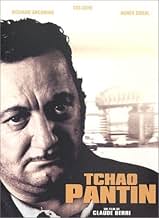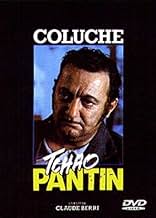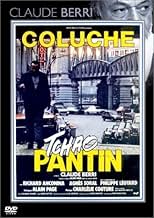AVALIAÇÃO DA IMDb
7,3/10
3,4 mil
SUA AVALIAÇÃO
Adicionar um enredo no seu idiomaA story of an odd friendship - and the unexpected consequences.A story of an odd friendship - and the unexpected consequences.A story of an odd friendship - and the unexpected consequences.
- Prêmios
- 5 vitórias e 7 indicações no total
Agnès Soral
- Lola
- (as Agnes Soral)
Philippe Léotard
- Bauer
- (as Philippe Leotard)
Mohamed Ben Smaïl
- Mahmoud
- (as Ben Smail)
Mickaël Pichet
- Mickey
- (as Mickael Paul)
Vincent Michel Paul Filliatre
- Momo
- (as Michel Paul)
Avaliações em destaque
Sometimes, the "magic" of cinema seems to take hold of us.
The two main characters are superb. So is cinematography. Everything is "in the dark, humid, without hope". Lanky Lola (1.78 m), while providing the inevitable love interest, is quite gelid and stolid, so her beauty (rain scene!, she awakening chez Lambert!) is not overtly "too much".
Bensoussan is a stupid kid, while Lambert... what a script! This should be required viewing for budding plot writers. He speaks seldomly, bluntly, seemingly without passion, world wearily, like a philosopher who decided to toss the world aside, as "a useless hypothesis". Gradually we get to know his intentions, which are not clear from the beginning (he's a master at deception :)!), but make sense afterwards. Unlike many Hollywood commercial thrillers, that try to be witty and only end up being preposterous. Or "revenge" films alla Stallone and Bronson, without any emotion because there's nothing to "balance" the killing spree.
This is a "cartesian" movie. "Clear and disc tint" ideas. If issued by a "gas station clerk", well, that's the master's disguise!
The Paris we witness is not the postcard's or Bardot's: everything is seedy, "the system" is rotten, like the copper Bauer's synthesis near the end: "There'll always be another one".
The ending is fine! Seldomly had I thought: "this should end right here", and it did.
IMDb reviewers agree on Bruno Nuytten (DP)'s work. Luckily enough, I hadn't read those reviews, and while watching even the first minutes I said: "what a good 'atmosphere'". That's a good work: noticeable even without "knowing it's something important".
Berri doing this shows a hidden potential. Pity he didn't do more of the genre! Maybe he "needed" all this "sun drenched Southern France" to make one "night" film...
I agree with IMDb reviewers like gregory-joulin about its two-part structure, and with Bob Taylor that probably the first part is the best. But I admit it: I felt more with the second. "Plot holes"? Many. But who won't remember the "murder by the small filling station" or the way he swiftly avoids Bauer's questioning. Unassuming, without hesitating, thus lethally. Just like what follows suit...
I liked his "method of interrogation": breaking the mobster's motorbike (not the man). And the way he answers to Bauer on why he was't working: (seeming concerned) "With all that happened, I had to take a few days off".
(About this film) Lambert would just quip: "Watch it".
The two main characters are superb. So is cinematography. Everything is "in the dark, humid, without hope". Lanky Lola (1.78 m), while providing the inevitable love interest, is quite gelid and stolid, so her beauty (rain scene!, she awakening chez Lambert!) is not overtly "too much".
Bensoussan is a stupid kid, while Lambert... what a script! This should be required viewing for budding plot writers. He speaks seldomly, bluntly, seemingly without passion, world wearily, like a philosopher who decided to toss the world aside, as "a useless hypothesis". Gradually we get to know his intentions, which are not clear from the beginning (he's a master at deception :)!), but make sense afterwards. Unlike many Hollywood commercial thrillers, that try to be witty and only end up being preposterous. Or "revenge" films alla Stallone and Bronson, without any emotion because there's nothing to "balance" the killing spree.
This is a "cartesian" movie. "Clear and disc tint" ideas. If issued by a "gas station clerk", well, that's the master's disguise!
The Paris we witness is not the postcard's or Bardot's: everything is seedy, "the system" is rotten, like the copper Bauer's synthesis near the end: "There'll always be another one".
The ending is fine! Seldomly had I thought: "this should end right here", and it did.
IMDb reviewers agree on Bruno Nuytten (DP)'s work. Luckily enough, I hadn't read those reviews, and while watching even the first minutes I said: "what a good 'atmosphere'". That's a good work: noticeable even without "knowing it's something important".
Berri doing this shows a hidden potential. Pity he didn't do more of the genre! Maybe he "needed" all this "sun drenched Southern France" to make one "night" film...
I agree with IMDb reviewers like gregory-joulin about its two-part structure, and with Bob Taylor that probably the first part is the best. But I admit it: I felt more with the second. "Plot holes"? Many. But who won't remember the "murder by the small filling station" or the way he swiftly avoids Bauer's questioning. Unassuming, without hesitating, thus lethally. Just like what follows suit...
I liked his "method of interrogation": breaking the mobster's motorbike (not the man). And the way he answers to Bauer on why he was't working: (seeming concerned) "With all that happened, I had to take a few days off".
(About this film) Lambert would just quip: "Watch it".
"Tchao Pantin" is a great movie. Its characters are all down to earth and have real feelings. Lambert, the burn-out alcoholic who works at the gas station befriends Bensoussan, a small-time pusher. The story goes on about their friendship, but breaks off into a new level when Bensoussan is killed. Lambert's not sure to risk his life and avenge him, but the perseverance of Bensoussan's latest girlfriend, Lola, convinces him. Even though the movie might run a little slow at times, it nevertheless exceeds in giving off exciting vibes (action and great dialogue). It's an interesting movie about a somewhat awkward relationship, but it works. It's the best thing about it. Side note, I'm just a little confused about the title and what it stands for. Anyway, you should really check it out, and you might even see an adaptation of it in a few years.
a film noir. it is the most easy definition for a film who escapes to a clear verdict. because it is one of the films who, after the final credits, becomes a state of emotions. sure, the great merit has Coluche. but he is part of an impeccable story, simple, honest, touching, bitter, about friendship and errors of past, appearances and love, justice and purpose of a broken life. a film like a confession. about yourself and about the others. and about the need to escape from yourself doing the right things in the right manner. a story who becomes a state of soul. this is the most important thing for this film. and the basic motif for who it is different. special. a sort of masterpiece out by ordinaries rules.
26 years later, the movie still has a cult on its own in France (and maybe in some other countries, I'm not aware of that).
Of course the fact that Coluche, a famous french comedy and stand-up artist, died too soon at 42 (in 1986, 3 years after the movie was released) is no stranger to that... not to mention it was his very first (and last) dark role - a deadbeat gas station employee in Paris seeking revenge -and somewhat redemption- by hunting down the killers who murdered his only friend, a young lowlife drug dealer.
Some lazy critics here and there mentioned there was some kind of Melville, Cassavetes and Scorsese influences in the movie but to me, they couldn't be more wrong. Take a close look at it and you won't find any trace of "Taxi Driver" or "Gloria" in it, despite Claude Berri, the director, has tried so hard to put some of these influences in his film.
It's basically a classic urban drama in 2 distinct parts (the "bound of trust / friendship" part 1 and the "hunt/revenge/redemption" part 2, seen in many movies before and after this one) but the tremendous ghost-like interpretation of Coluche (who was facing drug addiction and sentimental issues at the time) and the extraordinary master work of D.P. Bruno Nuytten took it all to rocket the movie to critic and commercial success.
Even if a few script holes might bother some viewers (especially a detective character -called Bauer- who seems to appear/disappear only to provide informations) the wandering of these shadow-like characters won't be forgotten for a long time and the very ending could ruin your day. Or even your week.
Of course the fact that Coluche, a famous french comedy and stand-up artist, died too soon at 42 (in 1986, 3 years after the movie was released) is no stranger to that... not to mention it was his very first (and last) dark role - a deadbeat gas station employee in Paris seeking revenge -and somewhat redemption- by hunting down the killers who murdered his only friend, a young lowlife drug dealer.
Some lazy critics here and there mentioned there was some kind of Melville, Cassavetes and Scorsese influences in the movie but to me, they couldn't be more wrong. Take a close look at it and you won't find any trace of "Taxi Driver" or "Gloria" in it, despite Claude Berri, the director, has tried so hard to put some of these influences in his film.
It's basically a classic urban drama in 2 distinct parts (the "bound of trust / friendship" part 1 and the "hunt/revenge/redemption" part 2, seen in many movies before and after this one) but the tremendous ghost-like interpretation of Coluche (who was facing drug addiction and sentimental issues at the time) and the extraordinary master work of D.P. Bruno Nuytten took it all to rocket the movie to critic and commercial success.
Even if a few script holes might bother some viewers (especially a detective character -called Bauer- who seems to appear/disappear only to provide informations) the wandering of these shadow-like characters won't be forgotten for a long time and the very ending could ruin your day. Or even your week.
In 1984, it was a quite different performer that got the Cesar for best actor, Coluche for "Tchao Pantin". In order to understand this win, one first has to learn who Coluche was.
Coluche was an actor who had established himself as a popular comedian before this film. His humour was quite crude, with him being one of the first French comedians that used swearwords to make jokes. He made fun of the establishment, and some of his jokes can be deemed politically incorrect today (for example, in the 1983 hit film "Banzaï", he made a joke by taking an inhaler from a patient while in the hospital, in order to relax). It should come as a surprise, then, that he accepted such a different role in Tchao Pantin.
At the time of the film's shooting, Coluche was having problems in his personal life. This enabled him to have an even more intense performance that ultimately won him the award.
In this film, he plays a retired police officer, Lambert, who meets a young man in trouble with criminals, played by Richard Anconina. Anconina was at the time one of the newest faces of French cinema, having been revealed through the film "Le battant", with Alain Delon. The pairing of the two actors was done by director Claude Berri, who made "Jean de Florette" two years later.
Claude Berri had worked again with Coluche in some films before this one, one of those being the excellent "Le maître d'école" (1981), in which Coluche played a schoolteacher. This movie not only showed Coluche's talent as a comedian, but also exposed the problems of the French school system in the 80s. It's plot was engaging, and all the actors gave exquisite performances.
The plot of "Tchao Pantin", though, struggles to get the film going. To my mind it didn't seem to have progressed but a little throughout the whole film, making the end seem a bit abrupt. The story revolves around Coluche's character meeting his only friend in the face of Anconina, whom he loses to a murderer. The ensuing pursuit of the perpetrator by Coluche is all that follows, until he finally gets them, at his own cost.
Director Claude Berri tried in this case to make a film noir, but I find his attempt unsuccessful. The film just keeps dragging on, despite the truly impressive performance of Coluche, who clearly deserved the César award. Anconina's acting left me mostly indifferent. Another performance which didn't really have an impact on me was the one by Agnès Soral, who played Anconina's friend, Lola. While wanting to come off as a punk rebel, she actually made the impression of being bored and not caring for anyone except for herself. To me, the causes of her nomination for the César for the best promising actress remain a mystery.
While I mostly pay attention to the music in the films, the score of this one didn't leave me a lasting impression.
In conclusion, "Tchao Pantin" was a lost opportunity by a good director and a well-paired cast to create an engaging film noir. While Coluche may have deserved accolades for his performance, the total result was the one of a film which set expectations that it ultimately couldn't live up to.
Coluche was an actor who had established himself as a popular comedian before this film. His humour was quite crude, with him being one of the first French comedians that used swearwords to make jokes. He made fun of the establishment, and some of his jokes can be deemed politically incorrect today (for example, in the 1983 hit film "Banzaï", he made a joke by taking an inhaler from a patient while in the hospital, in order to relax). It should come as a surprise, then, that he accepted such a different role in Tchao Pantin.
At the time of the film's shooting, Coluche was having problems in his personal life. This enabled him to have an even more intense performance that ultimately won him the award.
In this film, he plays a retired police officer, Lambert, who meets a young man in trouble with criminals, played by Richard Anconina. Anconina was at the time one of the newest faces of French cinema, having been revealed through the film "Le battant", with Alain Delon. The pairing of the two actors was done by director Claude Berri, who made "Jean de Florette" two years later.
Claude Berri had worked again with Coluche in some films before this one, one of those being the excellent "Le maître d'école" (1981), in which Coluche played a schoolteacher. This movie not only showed Coluche's talent as a comedian, but also exposed the problems of the French school system in the 80s. It's plot was engaging, and all the actors gave exquisite performances.
The plot of "Tchao Pantin", though, struggles to get the film going. To my mind it didn't seem to have progressed but a little throughout the whole film, making the end seem a bit abrupt. The story revolves around Coluche's character meeting his only friend in the face of Anconina, whom he loses to a murderer. The ensuing pursuit of the perpetrator by Coluche is all that follows, until he finally gets them, at his own cost.
Director Claude Berri tried in this case to make a film noir, but I find his attempt unsuccessful. The film just keeps dragging on, despite the truly impressive performance of Coluche, who clearly deserved the César award. Anconina's acting left me mostly indifferent. Another performance which didn't really have an impact on me was the one by Agnès Soral, who played Anconina's friend, Lola. While wanting to come off as a punk rebel, she actually made the impression of being bored and not caring for anyone except for herself. To me, the causes of her nomination for the César for the best promising actress remain a mystery.
While I mostly pay attention to the music in the films, the score of this one didn't leave me a lasting impression.
In conclusion, "Tchao Pantin" was a lost opportunity by a good director and a well-paired cast to create an engaging film noir. While Coluche may have deserved accolades for his performance, the total result was the one of a film which set expectations that it ultimately couldn't live up to.
Você sabia?
- CuriosidadesThe title "Tchao, Pantin" became a very well-known expression in France to define a comedian's spectacular dramatic breakthrough, in reference to Coluche who only starred in comedies prior to the film and earned the César for his performance. The term can also be used in a derogatory way when a comedian's dramatic film fails to achieve the same success and then gets dismissed as a wannabe "Tchao pantin".
- ConexõesFeatured in Un jour, un destin: La face cachée de Coluche (2008)
- Trilhas sonorasLes Nuits sont trop Longues
Music by Charlélie Couture
Lyrics by Charlélie Couture
Performed by Charlélie Couture
Principais escolhas
Faça login para avaliar e ver a lista de recomendações personalizadas
- How long is So Long, Stooge?Fornecido pela Alexa
Detalhes
- Data de lançamento
- País de origem
- Idioma
- Também conhecido como
- So Long, Stooge
- Locações de filme
- Empresa de produção
- Consulte mais créditos da empresa na IMDbPro
Contribua para esta página
Sugerir uma alteração ou adicionar conteúdo ausente

























